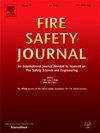Experimental study on the flame trajectory evolution of horizontal jet fires under reduced pressures
Abstract
Jet fire including process pipeline/tank leakage, oil exploitation industry of tail gas treatment flare or other industrial combustors as a common phenomenon can be found at high altitude areas. This work characterizes the flame trajectory evolution of horizontal jet fires under reduced pressures, which is rarely studied. The experimental results show that the horizontal flame projection distance increases monotonously, but the vertical flame length first increases and afterward decreases with the increase of heat release rate and the decrease of ambient pressure. Meanwhile, flame trajectory length increases significantly and then slowly with increasing heat release rate, but first increases to a maximum value and afterward declines with decreasing ambient pressure. Meanwhile, the turning point of vertical flame length appears earlier than that of flame trajectory length with increasing heat release rate (or jet velocity at source) and decreasing ambient pressure. Then, a mathematical model based on the flame arc hypothesis and a dimensionless model were proposed to describe the flame trajectory length, the momentum-buoyancy length scale was used to normalize the flame trajectory length. The measured flame trajectory length in terms of the nozzle diameter, heat release rate, and ambient pressure was satisfactorily correlated by the proposed models.

 求助内容:
求助内容: 应助结果提醒方式:
应助结果提醒方式:


